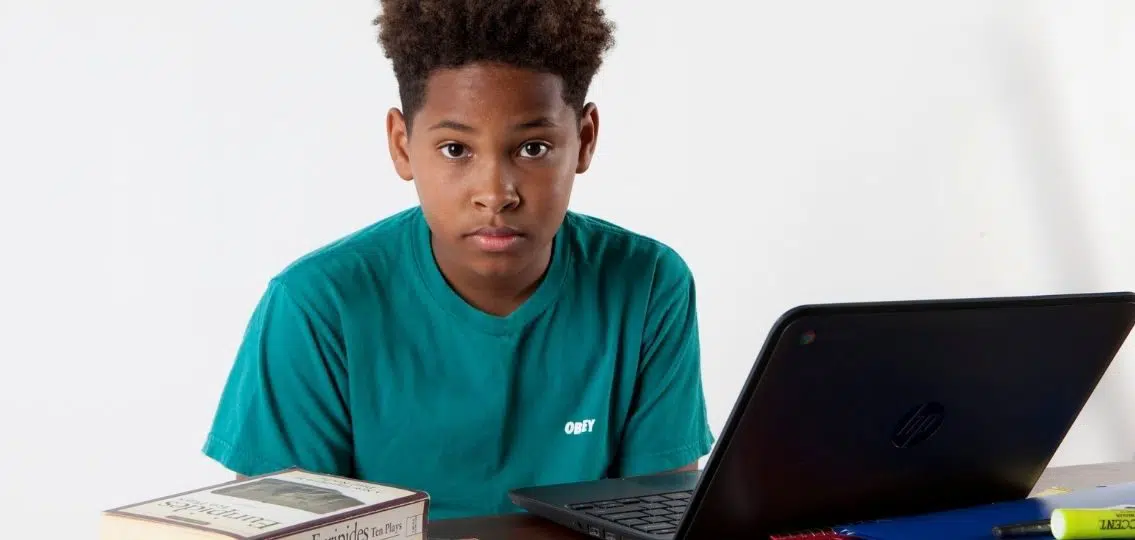During the second semester of my oldest child’s sophomore year in high school, I learned about passive transport every time I brushed my teeth. My busy student had taped her biology notes to the wall near the sink so she could study them any chance she got.

Over the years of watching my children collectively balance school, dance, pom team, band, relationships, jobs, family, church, and the rest, I have noticed their creative ways of finishing what they have to do—their schoolwork—so they can get on with what they want to do (everything else).
Maybe one or more of these tricks will help your busy student sneak in the studying they have to do so they can get on with their want-to-do list, too.
4 Study Hacks for Middle and High School Students
1. Multitask smartly.
Over the last few years, several studies have broken the news to us that our brains aren’t nearly as good at multitasking as we’d like them to be. Simply put: our minds are only designed to focus fully and well on one central task at a time. But multitasking can work if one of the activities doesn’t require our brains to be paying too much attention.
My teens have covered a lot of academic ground in the shower. They can pretty much lather, rinse, and repeat on auto-pilot. This frees up their minds to pay attention to the vocab sheets or study guides they load into gallon storage bags and clip to the shower door. Ditto for reviewing class materials while they eat breakfast or blow-dry their hair.
2. Listen up.
My husband is an auditory learner. He survived law school by reading notes from class into a mini tape recorder (this was way before phone voice memos) and then listening to them over and over. Even when he wasn’t paying full attention, the information worked its way into his brain. My teenager employs a similar trick by downloading audio versions of books she has to read for her English classes and putting them on as “background music” to other life activities. She still reads the books in traditional fashion, but putting another sense to work helps cement the overall storyline and some of the specific details.
3. Fire away.
For most of the semesters my high schooler was taking Spanish, I had a set of notecards propped up on my kitchen counter along with my recipes. Whenever I was standing at the counter, and my daughter wandered into the kitchen or passed by on her way out the door, I’d throw out a question based on those notes. “Quick!” I’d yell while she was putting on her shoes. “Tell me three things you know about the Mexican Revolution!”
I fired off verbs for her to conjugate and words I couldn’t pronounce for her to translate and, during her unit on travel, questions like, “How do you say ‘I lost my luggage’ in Spanish?” Shooting these pop quizzes at her at random times when she wasn’t otherwise thinking about Spanish reinforced what she was supposed to be learning during her official class and study time. If she could shoot back the correct answers without much delay, she knew she would probably be able to do the same during, say, the dreaded in-person, entirely-in-Spanish phone calls with her online teacher.
4. Sleep on it.
More than once, I’ve found my teens in our living room or awake in their bedrooms late at night, trying to cram one more fact into their brains. “Go to sleep!” I tell them. They usually fight me, because they feel like they’re giving up study time, but I remind them that sleep is not passive for our minds or bodies. When our students sleep, the information they’ve studied during their waking hours gets reorganized for optimum retrieval later on.
It’s as if sleep is an administrative assistant taking a jumbled pile of papers, sorting them, and filing them away so that when a particular fact is needed—during a test, for instance—our kids’ brains can access it from those neatly organized files. And of course, fact recall is easier if their eyes aren’t drooping shut during the test due to lack of sleep.
Changing up study locations and methods helps my busy teens maximize their learning. A little reviewing in the shower, some audio reinforcement, a pop quiz here and there, and the mental reorganization of rest all act like reboots for the incredible computers that are our kids’ minds.

I never did figure out what passive transport is. (To me, it sounds like taking a nap in the car while someone else drives.) But my student managed her time well enough to ace biology and still have space in her schedule for everything she enjoys. All of which I thought was a little sneaky and a lot smart of her.





